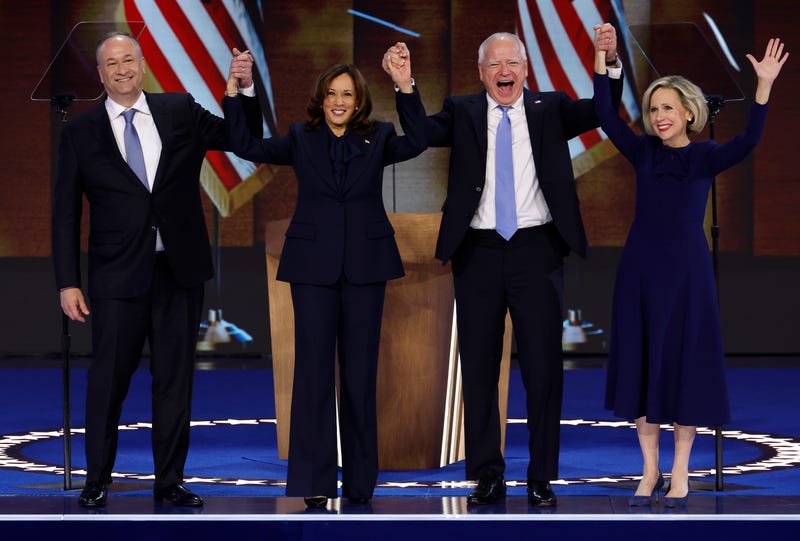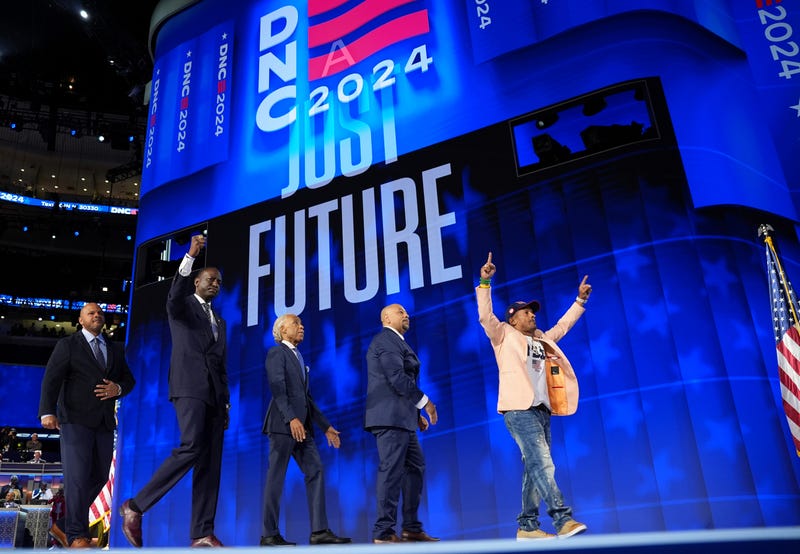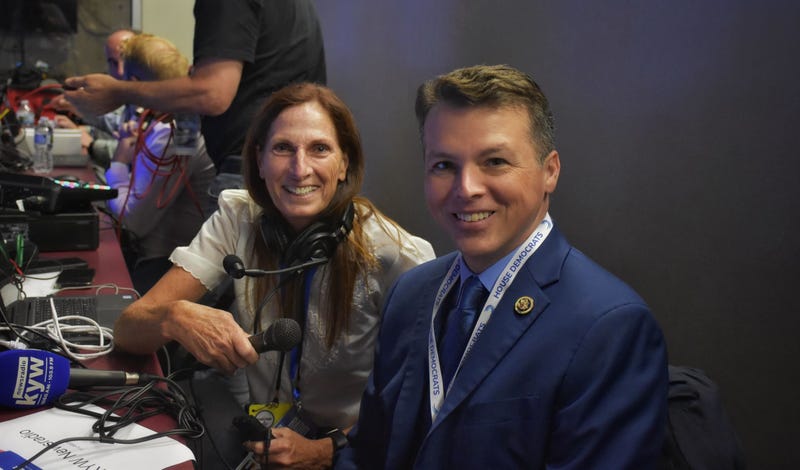
CHICAGO (AP, KYW Newsradio) — Vice President Kamala Harris told voters they have a chance to chart a "new way forward" as Americans this November, as she looked to introduce herself to voters and prosecute her case against Republican Donald Trump as she accepted her party's nomination Thursday night at the Democratic National Convention.
Harris walked onstage to thunderous applause and a long standing ovation as convention-goers chanted her name, before beginning her remarks.
“Our nation with this election has a precious, fleeting opportunity to move past the bitterness, cynicism, and divisive battles of the past,” Harris said, as she accepted the nomination. “A chance to chart a New Way Forward. Not as members of any one party or faction, but as Americans.”
Harris' address in Chicago caps a whirlwind eight weeks in American politics and manifests the stunning reversal of Democratic fortunes just 75 days until Election Day. Party leaders, who had publicly despaired over President Joe Biden's candidacy after his disastrous debate against Trump, were jubilant both at the historic nature of Harris' candidacy and their buoyed hopes for this November.
"America, the path that led me here in recent weeks was no doubt unexpected. But I'm no stranger to unlikely journeys," she said.
Harris, the daughter of immigrants from Jamaica and India, is the first Black woman and first person of South Asian descent to accept a major party's presidential nomination, and if elected, she would be the first female U.S. president. As she took the stage, she looked out across a sea of female delegates and Democratic supporters wearing white — the color of women's suffrage — the movement that culminated with American women securing the right to vote in 1920.
Despite Harris' prominence as vice president, she has spent four years in President Joe Biden's shadow, which has kept some Americans from fully knowing her personal history and her political vision for the country. Just a month after Biden ended his reelection bid and endorsed her to replace him atop the Democratic ticket, Thursday was her chance to define herself to millions of voters on her own terms.
Harris told voters about her background, rising from a middle-class family, why she became a prosecutor, her achievements as a prosecutor, and how she would govern as president.
She talked about being raised primarily by her mother, after her parents divorced, in a small apartment in San Francisco’s East Bay, and being raised as well by friends and caregivers who were “family by love.” She also detailed a key part of her political origin story, when Wanda, her best friend from high school, confided in her that she was being abused by her stepfather and came to live with Harris' family.
“That is one of the reasons I became a prosecutor. To protect people like Wanda,” Harris said.
She said strengthening the middle class would be a priority. She said she would defend America's reputation and leadership overseas. She promised a government with dignity, compassion and respect.
Among others who spoke before Harris on Thursday were Michigan Gov. Gretchen Whitmer, North Carolina Gov. Roy Cooper, Gabby Giffords, the Arizona Democrat who was nearly killed in a mass shooting in 2011, and civil rights leader Al Sharpton.

Sharpton highlighted the historic nature of Harris' nomination, noting that 52 years ago, he was a youth director for former Rep. Shirley Chisholm's 1972 Democratic primary bid for the White House. Chisholm, who was Black, died in 2005, but Sharpton drew cheers when he declared, "I know she's watching us tonight as a Black woman stands up to accept the nomination for president of the United States."
Sharpton also introduced the now-exonerated members of the Central Park Five — who, in 1989, as teenagers, were wrongly convicted of rape in New York City. Trump took out full-page newspaper ads at the time calling for the five, who are Black, to be sentenced to death — and even today sidesteps calls to apologize.
Thursday night's programing also aimed to appeal to anti-Trump Republicans, asking them to put aside party labels and support Harris. Former Rep. Adam Kinzinger of Illinois, a Republican, was granted a prime-time spot minutes before Harris took the stage to say he and the vice president share an allegiance to the rule of law, the Constitution, and democracy.
"Whatever policies we disagree on pale in comparison with those fundamental matters of principle. Of decency. Of fidelity to this nation,” he said.
The theme Thursday night was all about the future, and U.S. Sen. Cory Booker of New Jersey said he thinks the delegates are already feeling it. He says there's a sense of a page being turned to a new day in America.
Energy levels inside the United Center have been high all week, with the atmosphere there often compared to a dance party. Harris thanked delegates for bringing the joy.

“What we see here is a genuine excitement and euphoria over the chances of the Democratic ticket to beat Donald Trump, yet again, and win this November,” Philadelphia-area Congressman Brendan Boyle said Monday as the convention was getting started.
Boyle identified a sense of on Monday: “We're in a time in which, on policy, there's probably more unity on the Democratic side than at any point in the last two centuries of the Democratic Party's history.”
The congressman credited the emotional impact of Joe Biden’s stepping aside and an optimism fueled by Harris’ rise to the nomination for that unity, and for giving the Democratic ticket the best possible chance in the general election.
“Every vice president who was running on his or her own for president brings their own style and their own set of issues to the table,” Boyle said. “You'll see a lot of similarities between Kamala Harris's agenda and the accomplishments and record of the Biden presidency, but then you also see things that are uniquely her.”
